Women of the Praia by Sally Cooper Cole

Author:Sally Cooper Cole [Cole, Sally Cooper]
Language: eng
Format: epub
Tags: Social Science, Anthropology, General
ISBN: 9780691214856
Google: 1dLgDwAAQBAJ
Publisher: Princeton University Press
Published: 2020-06-30T04:35:45+00:00
CLASS AND GENDER: WOMEN DIVIDED
Social stratification in Vila Chã divided parish women. It also created the conditions that gave rise to the fragmented consciousness of maritime women: on the one hand, maritime women were proud to identify themselves as workers, trabalhadeiras; on the other hand, they knew their productive work denoted their membership in the lowest social class of the parish.26
In earlier chapters we have described how lavradores and pescadores expressed their antagonistic social and economic interests in the parish through their different centers of residence, different strategies for marriage, and different household structures, and how differences in the gendered division of labor reinforced the division between agricultural and maritime households. Maritime women and men mobilized their gender system in their creation of a culture of opposition, part of a general resistance to the power and status of local lavradores in parish life. Once again, gender is a metaphor for the expression and negotiation of other social relationships and other levels of identity (cf. Herzfeld 1986). Whereas lavradores were proud to assert that women in their households did not have to work in the fields, Pescadores were proud to validate maritime womenâs identity as industrious and productive workers responsible for the economic well-being of the household.
In the gendered division of labor in the maritime household, women worked outside the home in economic production, and they were managers (governadoras) in their households. They moved freely about the parish, barefoot and in ragged work skirts, as they sold their fish and seaweed, or sold their labor as agricultural day workers. They worked side-by-side with men in the fields, on the beach, or at sea. Their productive work left them with few hours each day within the walls of their houses; they returned home only to sleep and eat.
By contrast, the wives of wealthy lavradores never performed manual labor in the fields and would never want to be seen in public in work clothes. They did not move about the parish because, unlike the fisherwomen, they had no work requiring them to do so. And they did not manage the economic resources of the household. In the wealthiest lavrador households, the husband ruled (mandava); the wife was a dona de casa (housewife) confined to the house, where she supervised domestic servants and passed her time with crochet or embroidery (Lino Netto 1949:60; Brochado de Almeida 1983:12).
Pina-Cabral (1986:83ff.) has described the gendered division of labor in Paço and Couto, two agricultural parishes in the interior Alto Minho; the description resembles the ideal held by lavradores in Vila Chã and contrasts with the division of labor in the maritime households. In the Alto Minho households, men look after the cattle and the produtos do ar (literally, âproducts of the airâ): the fruit trees, the vines, the olive trees, and the pine woods. And men undertake any business external to the household, such as bureaucratic tasks and wage employment. Women are concerned with the produtos da terra (things that grow in or near the soil), the
Download
This site does not store any files on its server. We only index and link to content provided by other sites. Please contact the content providers to delete copyright contents if any and email us, we'll remove relevant links or contents immediately.
Zero to IPO: Over $1 Trillion of Actionable Advice from the World's Most Successful Entrepreneurs by Frederic Kerrest(4506)
Machine Learning at Scale with H2O by Gregory Keys | David Whiting(4292)
Never by Ken Follett(3937)
Harry Potter and the Goblet Of Fire by J.K. Rowling(3848)
Ogilvy on Advertising by David Ogilvy(3603)
Shadow of Night by Deborah Harkness(3356)
The Man Who Died Twice by Richard Osman(3070)
Book of Life by Deborah Harkness(2930)
The Tipping Point by Malcolm Gladwell(2911)
Will by Will Smith(2906)
0041152001443424520 .pdf by Unknown(2843)
My Brilliant Friend by Elena Ferrante(2824)
Purple Hibiscus by Chimamanda Ngozi Adichie(2820)
How Proust Can Change Your Life by Alain De Botton(2804)
How to Pay Zero Taxes, 2018 by Jeff A. Schnepper(2646)
Hooked: A Dark, Contemporary Romance (Never After Series) by Emily McIntire(2544)
Rationality by Steven Pinker(2351)
Can't Hurt Me: Master Your Mind and Defy the Odds - Clean Edition by David Goggins(2321)
Borders by unknow(2301)
